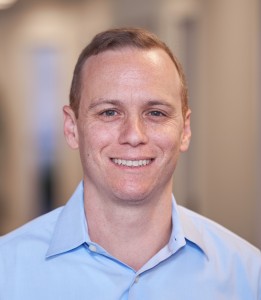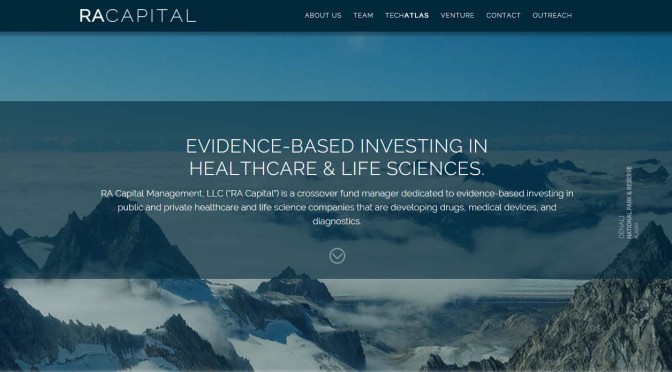In an effort to continually explore the interface between science and business, Tufts Biomedical Business Club recently caught up with Dr. Zach Scheiner, an Associate at RA Capital Management, for a discussion about his experience in the healthcare investment industry.
RA Capital Management is a crossover fund manager dedicated to evidence-based investing in public and private healthcare and life science companies. Prior to his current role at RA Capital, Zach worked as a Science Officer at the California Institute for Regenerative Medicine, where he managed a portfolio of research programs concentrated in translational neuroscience. He holds a BS in Molecular Biophysics and Biochemistry from Yale University, and a PhD in Neurobiology and Behavior from the University of Washington.

As an Associate for RA Capital, Zach’s efforts are realized through the team’s core research division, TechAtlas. This division is a scientifically trained team that maps out competitive landscapes in a continual effort to survey the landscape and identify emerging therapeutics and technologies that will reshape how physicians treat disease. The interview is edited for brevity and clarity.
Tell me about the career path that led you to your job. How did you become involved with RA Capital Management?
My interest in biomedical science and research began as an undergrad, when I had several summer research internships and was exposed to a few different fields of research. At the same time I had my first opportunity to teach science classes at a local high school and quickly realized that I also had a passion for teaching. After graduating, I decided to teach middle school science and math for a year (which turned into three) before returning to research and going to grad school.
I attended the Neurobiology & Behavior graduate program at The University of Washington in Seattle. My thesis work focused on the molecular basis of memory and drug addiction. Though I enjoyed my time as a graduate student, by my fourth year I began to realize that the academic career path and spending more years at the lab bench were not for me. I really enjoyed reading primary literature, planning experiments, and reviewing/analyzing data, so as I finished up graduate school I began looking at alternatives where I might be able to incorporate these interests as well as leverage my scientific background in a non-research capacity.
I found a great opportunity at the California Institute for Regenerative Medicine (CIRM) in San Francisco. CIRM funds stem cell research at institutions throughout California with the goal of advancing promising stem cell based therapies into clinical trials and ultimately to patients. I began as a science writer and quickly moved to a position managing a portfolio of translational research programs. In this position, I worked closely with funded scientists to help set milestones and success criteria, assess progress, and, however possible, facilitate success. In my six years at CIRM I learned a tremendous amount about the drug development process, gained experience reviewing and analyzing data, and developed management skills, all of which have been invaluable in my current role at RA Capital.
My move to RA Capital was the result of my wife being offered an assistant professorship at Brown University. In preparation for the move from one coast to the other I reached out to everyone in my network, including an old lab-mate I had stayed in touch with from graduate school who was now an Associate for RA Capital. I had a long-time interest in biotech investing, nurtured by my dad, and had been learning about this part of the industry in my spare time. Luckily, RA was hiring and the rest is history. For me, RA Capital was a perfect fit. I can put my communication and analytical skills from teaching, grad school and CIRM to good use and I love staying immersed in cutting-edge science while learning more about the investment side of the biotech industry.
What are the duties/functions/responsibilities of your job?
As an Associate with RA Capital, my primary role involves creating dendrograms (mind-maps) of specific diseases or capabilities within the healthcare industry. These comprehensive landscape maps take all the available drugs, both on the market and still in development, and put them into the context of current standard of care and unmet needs. They help our team fully appreciate and contextualize the market potential of assets and companies before making investments. Mapping out a disease landscape is a research-intensive process that involves surveying the literature, meeting with companies with assets in the space, speaking directly to physicians, attending scientific conferences, and analyzing data. The process can take several months to complete but the maps are never truly finished. Therapeutic landscapes are constantly evolving, new data are released and new licensing and acquisition deals are made. Our maps are equally dynamic and a lot of my time is spent staying up to date with the latest news and data coming out in the areas I cover.
In addition to mapping, Associates also join the investment team in diligence projects on specific investment opportunities. Our maps are a great way of contextualizing drugs and their competitors and can help our team identify potential new opportunities but it’s always critical to dig deeper before making an investment. One of the most rewarding parts of my job is seeing all the work I’ve put in researching and understanding a therapeutic space pay off with insights that are potentially investable, or that directly benefit a diligence project.
On a day-to-day basis I also survey industry news and the scientific literature not only to keep up with the science but to search for new investment opportunities that could be licensable for an RA Capital portfolio company or even form the basis for a new company. I also enjoy being involved in the recruiting process at RA and playing a small role in shaping the future of the company.
What is the most rewarding part about your job?
Personally, the most rewarding part of my work is knowing that we are investing in companies that are developing therapies for patients that really need them! These companies often have no marketed drugs and need capital to advance their assets through clinical trials and into the hands of patients. When I think about the work that I do, I know I am helping to identify great science, underappreciated drugs, and promising new opportunities. And I hope that by influencing where RA Capital’s dollars are invested, I’m impacting the whole healthcare ecosystem in a positive way.
What experiences best prepared you for your job?
I think all of my previous work experiences helped prepare me for RA Capital, the first of which was teaching. Communication is such an essential skill and getting an opportunity to develop this early in my career has been a huge benefit. Having controlled a classroom every day for three years definitely makes communicating with colleagues, companies and scientific experts a little easier. Effective communication is a vital part of this job.
The second experience is my time spent as a graduate student. In graduate school I learned how to rigorously analyze data, both my own and from the literature. I developed my critical thinking and analytical skills and the ability to quickly identify key questions, design key experiments, and understand the limitations of a study.
Lastly, at CIRM I learned the process of moving a drug from the lab to the market and everything in between. I also regularly participated in grant review meetings with panels of scientists, clinicians, and patient advocates. These meetings gave me the opportunity to learn what was truly important to each group. While the views and opinions would often vary between the groups, one key takeaway was that for a drug to succeed, doctors have to want to prescribe it and patients have to want to use it. My experience at CIRM taught me to evaluate drugs with the patient perspective in mind; new therapies are worthless unless patients will use them, and sometimes improvements that appear marginal can be very meaningful to patients.
What skills or personal characteristics do you feel contribute most to success in this industry?
Very often, investment firms require that applicants have a background in finance, an MBA, or prior experience in the industry. That is not the case at RA Capital. I wouldn’t say any particular background or degree is required, but there are certainly skills that are critical. Analytical skills, for example. The ability to rigorously analyze data and quickly get to the “meat” of primary literature or a clinical data set is invaluable. Another key skill is effective writing and communication. Much of my day is spent writing and talking. I am continuously expressing my thoughts and providing analysis and it is important to do so concisely and effectively.
In terms of personal characteristics, I would highlight skepticism. Being skeptical is a common trait among scientists due to the nature of research, but this skill is especially important when meeting with companies. Every company is trying to convince us that their assets or data are the best. Skepticism is required to separate the pitch from the quality of the science.
Humility is another important personal characteristic. To put it simply, in something as complicated as drug development, it’s easy to be wrong! There are so many variables to consider, and science changes so quickly; it’s essential to have an open mind and be humble about everything you do not know.
What are the biggest challenges you face as an associate for RA Capital Management?
I think the largest challenge I face is simply the pace of the industry and science itself. There is new data coming out all the time; from company press releases, new primary literature, scientific conferences—the amount of information can be overwhelming. Developing the ability to quickly assimilate and analyze new information is the biggest challenge. But it’s also one of the things I enjoy most about my job. In this field you have to enjoy constant learning and also get good at processing information quickly enough to inform an investment decision. The fast pace is challenging but exciting.
What are some other opportunities within RA Capital Management for scientists aside from the TechAtlas Research Division?
Most opportunities for PhD trained scientists are within our TechAtlas research team. This team is made up primarily of PhD trained scientists in either Associate or Scientific Writer positions. The Science Writers work closely with the Associates as they build the story of their map, acting as a thought partner to develop the key insights for standard of care, unmet needs, and investable opportunities for each disease. As members of the research team gain experience, they can specialize in one of several areas, including early-stage assets, strategic analysis of licensing and partnerships, and equity analysis.
For somebody interested in pursuing this career, what would be your advice to best prepare them?
I would highly recommend that PhD candidates supplement their education in three areas: biostatistics, clinical trials, and FDA regulatory pathways. These topics are not always emphasized or even addressed in many graduate programs. A working knowledge of biostatistics goes a long way; being able to understand statistical pitfalls and the pros and cons of different analyses is invaluable. I would also recommend becoming familiar with clinical trials: the general FDA requirements for advancing drugs into Phase 1 trials and the typical development path for new therapies in your field of interest. Few graduate students get exposed to these areas. I would strongly suggest looking beyond the specific questions of own research project to get an understanding of the broader context: the standard of care for the disease, unmet needs, and competing approaches. If your research isn’t disease or therapy focused, choose a disease of interest or imagine potential applications of your work and research those. Putting new research and data into a broad context is a lot of what we do, so the earlier you can start practicing, the better prepared you will be.

